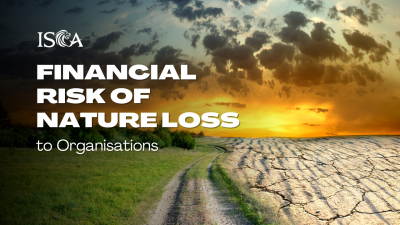
By continuing to use the ISCA Academy website, you agree to the use of cookies in accordance with our cookie policy. Cookie policy
Financial Risks of Nature Loss to Organisations
English
Last updated
Tue, 04-Mar-2025
Course Description
Course description
Nature loss is a significant issue
across Southeast Asia and the globe. However, Asia is the most underperforming
continent on Aichi Target 11, which committed governments to protect ≥17% of
their terrestrial environments by 2020. Furthermore, the World Economic
Forum estimates that 42% of all species in Southeast Asia could be lost by the
turn of the century, threatening 63% (US $19 trillion) of Asia Pacific GDP. It
is therefore paramount for companies to act on nature loss to ensure long-term economic stability in the region.
This executive-level course is
designed for board directors to address the drivers and financial risks of
biodiversity loss, with a focus on the emerging IFRS S3 standard on nature. As
IFRS S3 evolves, biodiversity—recognized as the twin crisis to climate
change—is expected to become a key component of regulatory frameworks. The course
will explore how nature loss can impact financial performance, investment
risks, and regulatory compliance, offering strategic insights into embedding nature
considerations into risk management. This enables organisations to stay ahead of
regulatory developments and ensuring long-term organizational resilience.
Objectives
•
Comprehend the strategic and financial significance of nature loss.
•
Evaluate the risks of biodiversity decline and its impact on
organizational performance.
•
Understand how biodiversity scenario analysis supports risk assessments.
•
Oversee and guide the development of effective nature-related risk
management strategies.
Course outline
I.
Understanding Nature-related Risks
a.
Importance of nature in organizational sustainability
b.
Key trends and drivers of degradation of nature
c.
Introduction to IFRS S3 and its implications on businesses
d.
Identification of material nature-related risks to the organisation
II. Financial
Implications of Nature-related Risks
a.
Assess financial risks: asset valuation, supply chain disruptions, and operational
impacts
b.
Potential effects for investment portfolios and shareholder value
c.
Legal and regulatory considerations related to nature
III. Governance
and Oversight
a.
Role of the board in overseeing nature-related financial risks
b.
Best practices to incorporate nature-related risks into risk management aligned
to IFRS S3
c.
Global outlook on regulatory developments related to nature

Dr Robert Charnock
Course Rating
Speaker's Rating

1 CPE Hour

Lesson
4
You have not enrolled to the BOD Programme!
Please click to sign up.
You have not subscribed to the BOD Library!
Please click to subscribe.

Succeed and lead with confidence as a board member. Empower yourself with up-to-date directorship training.
